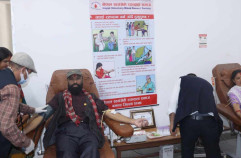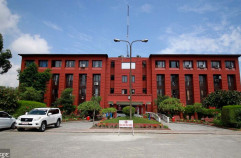Refusal to issue an injunction on the cancellation of the Nepalese doctor's examination
We use Google Cloud Translation Services. Google requires we provide the following disclaimer relating to use of this service:
This service may contain translations powered by Google. Google disclaims all warranties related to the translations, expressed or implied, including any warranties of accuracy, reliability, and any implied warranties of merchantability, fitness for a particular purpose, and noninfringement.


The United States Medical Licensing Examination (USMLE) has refused to issue an injunction regarding the cancellation of the results of 832 Nepali examinees by the US-based District Court of Columbia, Washington.


US local time on February 21, Judge Christopher R. Cooper's hearing after a single bench hearing denied the injunction . With the court's refusal to grant an injunction on the USMLE results freeze, there is confusion as to what will happen to the February 16 deadline for examinees to review. It will be more clear only after the court publishes the full text of its decision. The court had previously stayed the USMLE's review deadline until further notice.
A Nepali doctor filed a lawsuit against the National Board of Medical Examiners (NBME), which directs the United States Medical Licensing Examination (USMLE), as the main opponent. He has filed a lawsuit demanding that the decision to cancel the examination results made by the USMLE should be stopped for now. Judge Cooper, after hearing the arguments of both sides, refused to stop the decision of canceling the results of USMLE for the time being, but kept the issue of 'class behavior' against Nepali doctors in 'reserved'. This means that Judge Cooper has not immediately made any decision regarding the USMLE's allegations of 'class behavior' against Nepali doctors.
Although the full details of the court's decision have not been made public yet, according to the experts, with this order of Judge Cooper, 832 Nepali doctors are almost certain to be ineligible for this year's matching. NBME also submitted to the US court the argument that Nepali doctors had unauthorized access to the question paper as the main reason for canceling the exam results.
According to NBME, the results of one step of 618 Nepali examinees, the results of two steps of 202 and the results of all three steps of 12 have been cancelled. Apart from this, the candidates whose results were canceled appeared in 2021, 2022 and 2023 . NBME has been made the main opponent in directing the USMLE in a lawsuit filed by a Nepali doctor in a US court. NMBE stated that it is a serious matter that examinees participate in the USMLE examination by maintaining access to question sources rather than their knowledge and clinical skills . "The petitioner's allegation that the USMLE canceled the results because the examinees are Nepali is not true," the reply said, "Although the results obtained by the examinees were questioned by the USMLE staff in good faith." And since they decided to cancel the results while raising questions about the future, Nepali doctors have filed a lawsuit claiming that it is illegal. She has also claimed that it is wrong to blame Nepali doctors as 'thieves'. In addition to this, it has been claimed that the board should also give reasonable compensation to the Nepali examinees including himself.
According to the written statement given by USMLE co-vice president Daniel Zurich in the court while defending the allegations made by the Nepalese doctor, the qualification of the doctor who filed the lawsuit has also been questioned. According to his claim, 90 seconds are given to answer one answer in the exam. However, Nepalese doctors have given many answers in less than 30 seconds and they are about 95% correct. He has claimed that the answer is not correct at that level even though he has given it as an approximation. In addition, the answers given by him in less than 20 seconds are 100% correct in Step 1 exam . Similarly, in step 2, the answers given within 30 seconds are 91 percent correct and the answers given within 20 seconds are 93 percent correct . But in the step 3 exam given by the US, fewer answers have been correct compared to step 1 and 2 . This type of answering tendency is often seen in Nepali examinees and it is also claimed in the statement.
प्रकाशित : फाल्गुन ११, २०८० १३:४१

 २८.१२°C काठमाडौं
२८.१२°C काठमाडौं

















